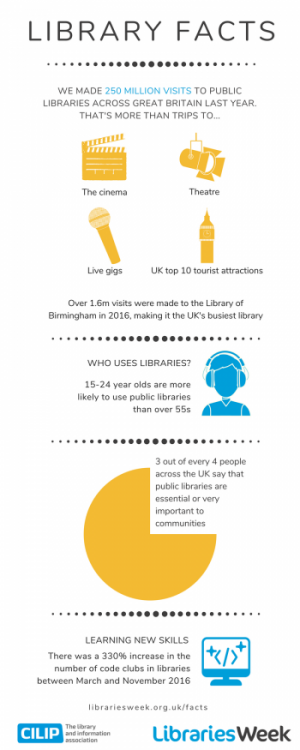
Library Lovers Unite: Libraries Week 2017
Read our report on the UK’s very first Libraries Week celebration, and the work being done to protect libraries and highlight the role they play in our communities.
Libraries Week took place between 9 and 14 October 2017. An initiative led by the Chartered Institute of Librarians and Information Professionals (CILIP), it was a cross-platform celebration, designed to highlight the creative and diverse activities that UK libraries have to offer, showcasing innovation and encouraging communities to ‘discover something new’ – the over-arching theme of this year’s event.
Over 1,000 libraries took part and hosted events, 325 of them in London. Not all the events involved reading: for example author Liz Pichon led the Guinness World Record attempt to hold the biggest disco dance with 350 primary school children. Meanwhile, illustrator Sarah McIntyre impressively led the biggest-ever Readathon event across schools in Liverpool.
Also to mark Libraries Week, CILIP released a list of surprising library-related facts, including the remarkable news that 250 million visits were made to public libraries last year, which exceeded visits to the cinema, theatre, the UK’s top ten tourist attractions, and the number of people that went to live music gigs in the same period combined. The CILIP data also showed that 15 to 24 year olds use libraries more than any other demographic, and that three quarters of people in the UK and Ireland believe that libraries are important to the community.
Google’s algorithm cannot do what librarians can: it has no capacity for empathy, so it cannot put the perfect book in the hands grasping out for it…
Protecting and promoting libraries in all places
Libraries Week also served as a reminder of those working to promote the role of libraries. Illustrator Chris Riddell was awarded the ‘highest library honour’ by being made an Honorary Fellow of CILIP. Riddell is renowned for using his illustrations and his influence to promote the value that libraries and librarians bring to people’s lives, and raising the challenges they currently face, with politicians. These challenges mainly centre on cuts to library services around the country. Chris Riddell also presented the ‘2017 Libraries Change Lives’ award to HMP Norwich, whose library has provided a vehicle for the delivery of cognitive therapy to ‘forgotten’ elderly prisoners suffering from dementia and memory loss in prison. The award also highlighted libraries in unexpected places, and the value of the work carried out by them.
Writer-led campaigns
Libraries Week also served to highlight a number of writer-led campaigns around the country aimed at preventing further decimation to library services, most recently ‘SaveHari’ in Haringey, north London. The ‘SaveHari’ campaign is being led by writers Fiona Dunbar, Daniel Whelan, and SF Said, and publicly supported by Michael Rosen, Meg Rosoff and Neil Gaiman, and aims to expose the damage caused by cuts and restructures to children’s library services in Haringey.
Explaining the rationale behind ‘SaveHari’, the campaigners commented: “Libraries are important because they are the great leveller: all their knowledge, all their power is available to everyone, for free, regardless of income. Now it could be said that the internet does that same job, and therefore libraries are no longer necessary: a relic of a desperate and distant past.
“The difference is that a library is staffed. Google’s algorithm cannot do what librarians can: it has no capacity for empathy, so it cannot put the perfect book in the hands grasping out for it; it cannot read widely and enjoying reading, so it cannot pass that passion on to young readers; and it can never change lives in the way librarians do every single day. A library is more than just a building full of books: it is the best of us, and is invariably staffed by the best of us too.”
Library cuts around the country have been taking place over the last decade, since the 2008 ‘credit crunch’ recession, which led to huge cuts in Government funding for arts and culture. A 2016 report by the BBC showed that 343 libraries had been closed in the space of six years, and almost 8,000 librarian jobs had disappeared country-wide. Over 15,000 volunteers have since been recruited to keep services going, but the replacement of skilled librarians with volunteers has caused much concern in the profession over the loss of such specialised knowledge.
Libraries Week 2017: A success to be repeated
Reflecting on Libraries Week, Nicholas Poole, CEO of CILIP, said: “We want everyone to discover what their library can do for them and with over 1,000 libraries bringing exciting events to their communities and taking part online, Libraries Week was a tremendous showcase of the range and diversity of services on offer in our libraries. We were delighted to see a strong emphasis on digital sessions like coding and video-making and more creative activities than ever around reading, learning and discovery. Thank you to everyone who took part, ran an event or turned out to support their library. We look forward to an even bigger Libraries Week 2018 and welcome participation from more libraries, supporters and partners to make that happen.”
